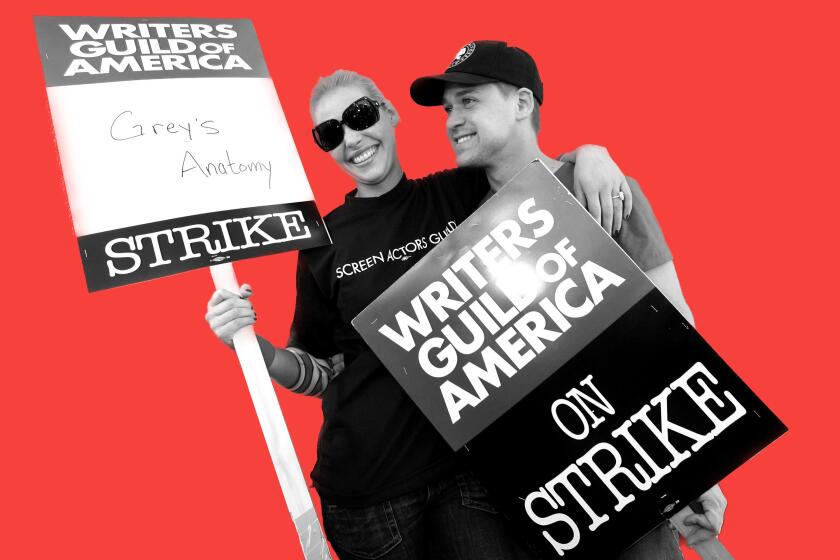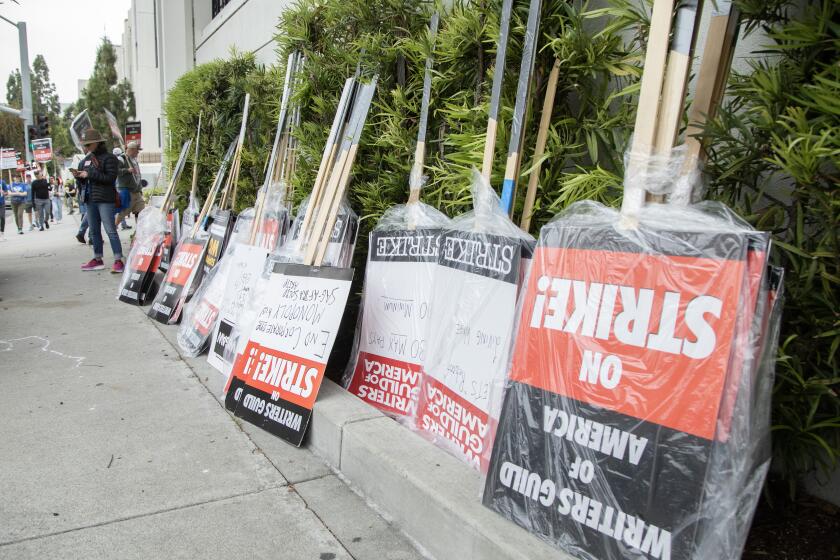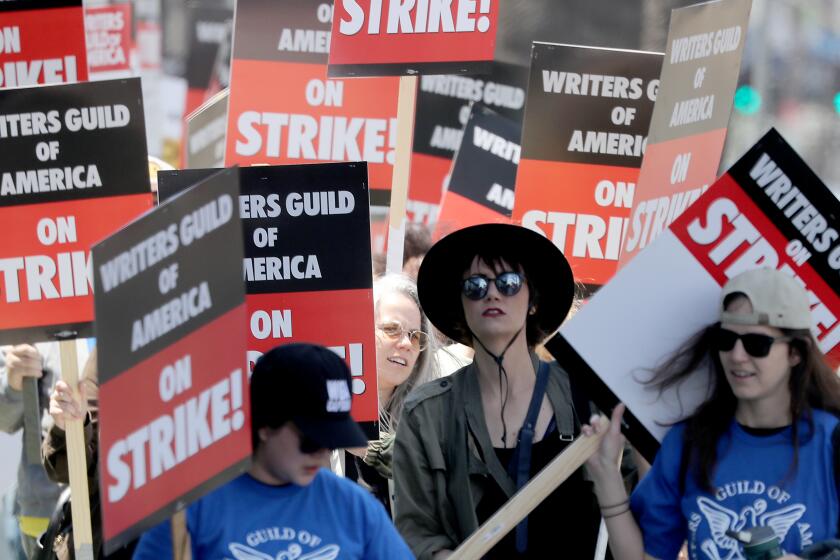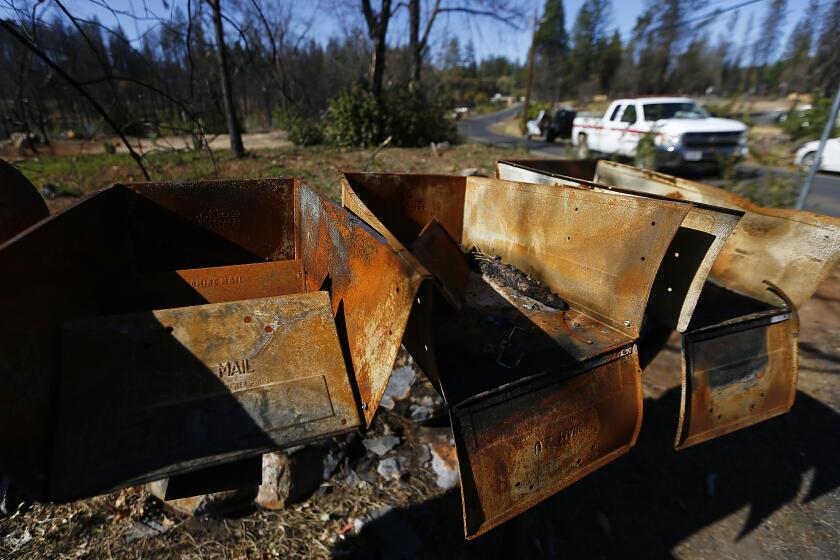
Fifteen years after Hollywood writers walked out, another possible strike is on the horizon.
Back then, the Writers Guild of America’s fight to secure residual payments for shows distributed online forced a standoff that shut down Hollywood for 100 days.
In retrospect, that contest over digital pay and home video residuals appears quaint. This time, tensions have reached a boiling point over the way streaming has steamrolled the industry.
The WGA recently asked members for a strike authorization as negotiations stalled with the Alliance of Motion Picture and Television Producers. The union, whose contract expires May 1, argues that while the shift to streaming has brought an unprecedented surge in content, it also has depressed pay across the board.

Subscribers get exclusive access to this story
We’re offering L.A. Times subscribers special access to our best journalism. Thank you for your support.
Explore more Subscriber Exclusive content.
Half of series writers now earn scale (the minimum episodic or weekly rate) compared with 33% during the 2013-14 season, according to a recent WGA survey.
“While the companies are making billions of dollars, spending more and more on streaming, writers are making less and less. That’s untenable. It’s unsustainable,” Chris Keyser, co-chair of the negotiating committee, said recently.
The Times spoke with five writers who shared their stories.
Although stunned by the medical leave of the union’s chief negotiator, many guild members have voiced confidence in his replacement, Ellen Stutzman.
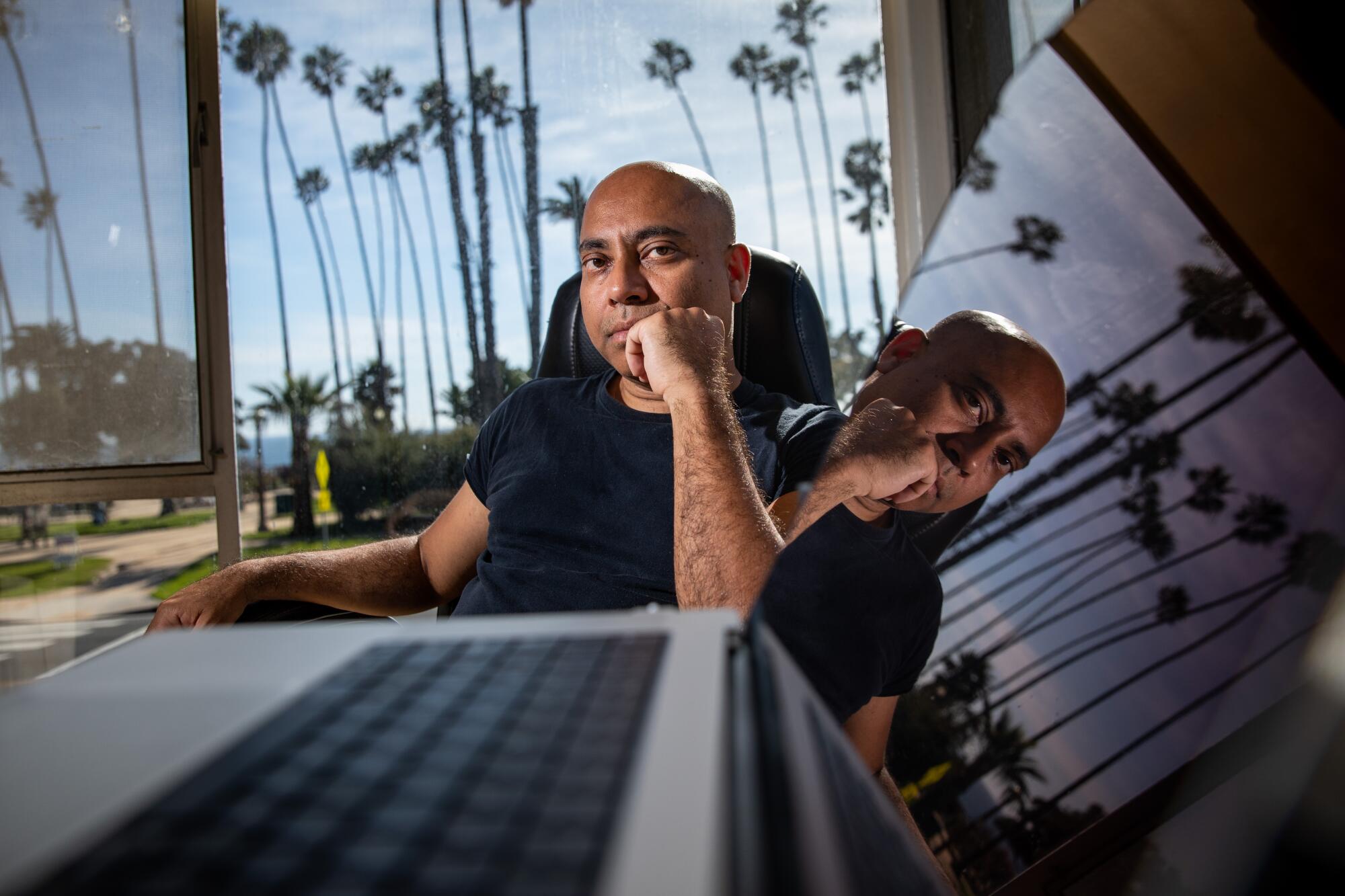
A gig economy
One of the most hotly debated issues is the pervasiveness of “mini-rooms,” in which fewer writers are hired for shorter periods of time. They’re a direct result of the profound shift in the way television is made and fueled by the rise of dominant streamers like Netflix.
The traditional network television model of ordering a 22-episode series based on a pilot show is rarer. Instead, studios and networks now frequently arrange what are known as “short orders,” series of perhaps eight or 10 episodes, convening small groups of writers to flesh out the themes of a show before deciding whether to go into production.
The 2007-08 writers’ strike, and lingering mistrust between big media companies and their Hollywood workers, has cast a long shadow over current WGA contract talks.
The upshot, the guild argues, is that fewer writers are squeezed to work more for less pay.
Television writer Kamran Pasha says the practice has turned what was once a remunerative and relatively steady job into just another gig-economy hustle.
What are minimums?
The minimum weekly rate that applies to staff writers’ employment starts at $4,154 if they are guaranteed for 40+ weeks. Minimums are higher if staff writers are employed for shorter periods of time. For all writers above staff writer, the minimum weekly rate starts at $7,412 and also goes up for shorter employment periods.
“A lot of these streamers, cable networks as well, are using mini-rooms,” Pasha said. “Studios are relying on these more and more, upending the traditional method of hiring writing staffs, which can be more expensive.”
Pasha, 51, started writing for television in the early 2000s, racking up a string of credits that includes Showtime’s crime thriller “Sleeper Cell,” “Kings” on NBC and “Roswell, New Mexico” for The CW.
Pasha recalled being invited by a major cable network, which he declined to identify, to participate in a writers room in 2017 as a producer with six other writers for a series about terrorism. The show featured Pakistani or Middle Eastern Muslim characters. Pasha, a Pakistani Muslim, was brought in specifically to help provide an authentic voice to one of those characters.
“It was something new for me that I had never experienced,” he said. “It was an experience that made me realize why people were critical of mini-rooms.”
In Pasha’s case, the group of seven writers was tasked with laying out the foundation of the proposed show.
Pasha had budgeted that about three months’ work would include weekly pay as well as the script fee for writing one episode.
He was paid $7,373 per week for 16 weeks. A script fee would have added another roughly $30,000, he said. According to Pasha’s calculations, he would need at least two such gigs a year to exceed his budgeted $200,000 annual salary.
However, Pasha later discovered the network had commissioned six episodes and that all the writers would get a script fee — except for him.
“The showrunner called me into the room and said, ‘Unfortunately, I just want to let you know we don’t have a script for you,’ and I was quite shocked. When I took the position, I budgeted the weekly rate, plus the presumed script fee that I was going to get. Working gig to gig, you’re budgeting, ‘How do I pay my rent the next seven months?’”
It was more than just a financial hit for Pasha, who also was a producer on the show.
“It also, for me, reflected how the industry defaults to ‘The brown guy doesn’t need a script,’” he said.
Inside the business of entertainment
The Wide Shot brings you news, analysis and insights on everything from streaming wars to production — and what it all means for the future.
You may occasionally receive promotional content from the Los Angeles Times.

Shortchanged by streaming?
When Netflix CEO Ted Sarandos hailed the success of the streamer’s 2020 period romance “Bridgerton” — watched by 82 million accounts for a total of 625 million hours — Leila Cohan, a writer on the series, fumed.
Then she turned to Twitter.
“This is cool news! You know what would also be cool? If i was getting residuals commensurate with working on a huge hit! New media is … just media. Pay up accordingly,” Cohan tweeted.
Cohan worked on the series for 20-plus weeks in 2018 and 2019, contributing to every episode; she was nominated for an Emmy in 2021. Yet, she and other writers say they haven’t reaped much of the financial benefits for contributing to such a massive hit.
Layoffs, hints of a recession and an uncertain future for streaming add up to contentious negotiations as the WGA looks for a new deal with Hollywood studios.
“The amount of residuals I’ve seen from ‘Bridgerton,’ or ‘Santa Clarita Diet’ [also on Netflix], is very minimal,” she said.
Residuals are the royalty-like fees paid out based on a matrix of calculations when shows are replayed.
Traditionally, writers working on network television shows could expect residuals well into the six figures, cushioning them during the lean times between projects. However, streaming residuals are not only significantly less, they are paid out on an annual basis as long as the show remains on the platform. And how these rates are formulated remains opaque.
When Cohan started her career in network television 11 years ago, writing was a lucrative job. Typically, a series had a set schedule of around 20 episodes and writers worked on them over 40 weeks.
For the past seven years, Cohan has worked almost exclusively for streaming, where her work has been punctuated by shorter, 20-week jobs with eight to 10 episodes. That has meant significantly less revenue from residuals.
Cohan worked on two seasons of MTVs drama “Awkward” in 2013 to 2015, contributing to 45 episodes. She receive writing credit on five and collected $115,345.15 in residual payments, or $23,069 per episode.
By contrast, Cohan earned $16,213.20 in residuals from one episode of Netflix’s “Santa Clarita Diet” that aired in 2017; and $12,581.88 for two episodes of the 2021 Netflix comedy series “Special.”
Cohan said she was paid $33,878.26 in residuals for writing one episode of “Bridgerton.” While that’s more per episode than what she made on “Awkward,” the shorter eight-episode first season for “Bridgerton” meant fewer writing opportunities — and less money, Cohan said. Moreover, she said, the residuals did not reflect “Bridgerton’s” global popularity.
“If [“Bridgerton”] had been on ABC and had been such a hit, they probably would have rerun it a lot and I also would have gotten a substantial payment for when it sold to foreign markets, and I would have gotten a payment when it went to streaming,” Cohan said. “And considering how much the companies are profiting off it, that doesn’t necessarily feel fair.”
Netflix declined to comment on Cohan’s specific claims. However, a spokesperson said the streamer pays more than other companies for residuals, noting that they are tied to fixed rates such as licensing fees, and not to viewership.
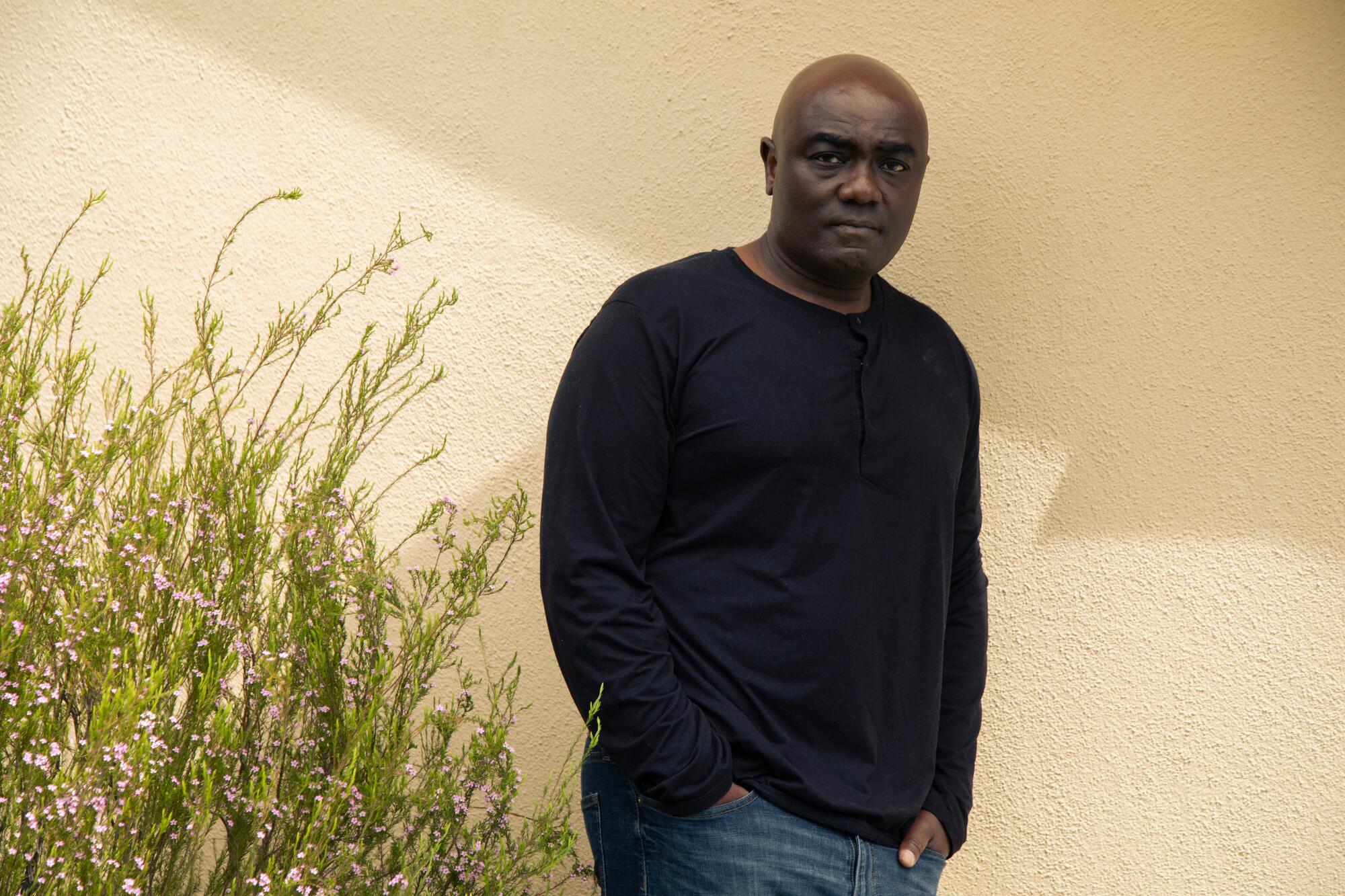
The squeeze on screenwriters
The streaming tsunami has walloped screenwriters too. Studios are releasing fewer movies, and theatrical attendance has not fully recovered from the pandemic. And while streamers are buying more feature scripts, the new demand has done little to fill the void, writers say.
According to a recent WGA survey, median screenwriter pay hasn’t moved since 2018 and, adjusted for inflation, has actually declined 14% in the last five years.
West Hills-based writer Sid Quashie can attest to that.
A graduate of USC’s prestigious film school, Quashie joined the WGA in 1998.
When Quashie started in the business, selling screenplays on spec, or writing scripts based on a studio’s existing property, would typically involve two steps of guaranteed payment.
Today, however, Quashie said that guarantee has been reduced to just one step, depressing his overall compensation.
Writers meet today to discuss the issues they expect will be at the center of difficult contract negotiations with the studios this spring.
For example, in 2003, Quashie said he sold a script for a big fantasy movie to Walt Disney Studios. He was guaranteed to be paid around $250,000. The money was split into payments for the first and second drafts over six months.
“If they didn’t like your first draft, they could still kick you off, but they would still have to pay you that second guaranteed step,” he said.
Fast-forward to 2019. Quashie sold a script to Netflix for a movie adapted from a young-adult book, but he said the streamer would guarantee only one step for less than $100,000. While deals vary, Quashie said that with the one-step deal, he earned about half what he did with guaranteed two-step deals 15 years ago.
Meanwhile, studios are buying fewer scripts, especially for lower-budget movies, he said.
Quashie has continued to sell features but said that in recent years his main income stream has come from selling TV pilots and writing for TV shows, including the CW fantasy drama “Charmed.”
“The middle-class writers who could subsist on two guaranteed steps were kind of getting squeezed out. You just had to take the only guaranteed step or you just didn’t work,” he said.
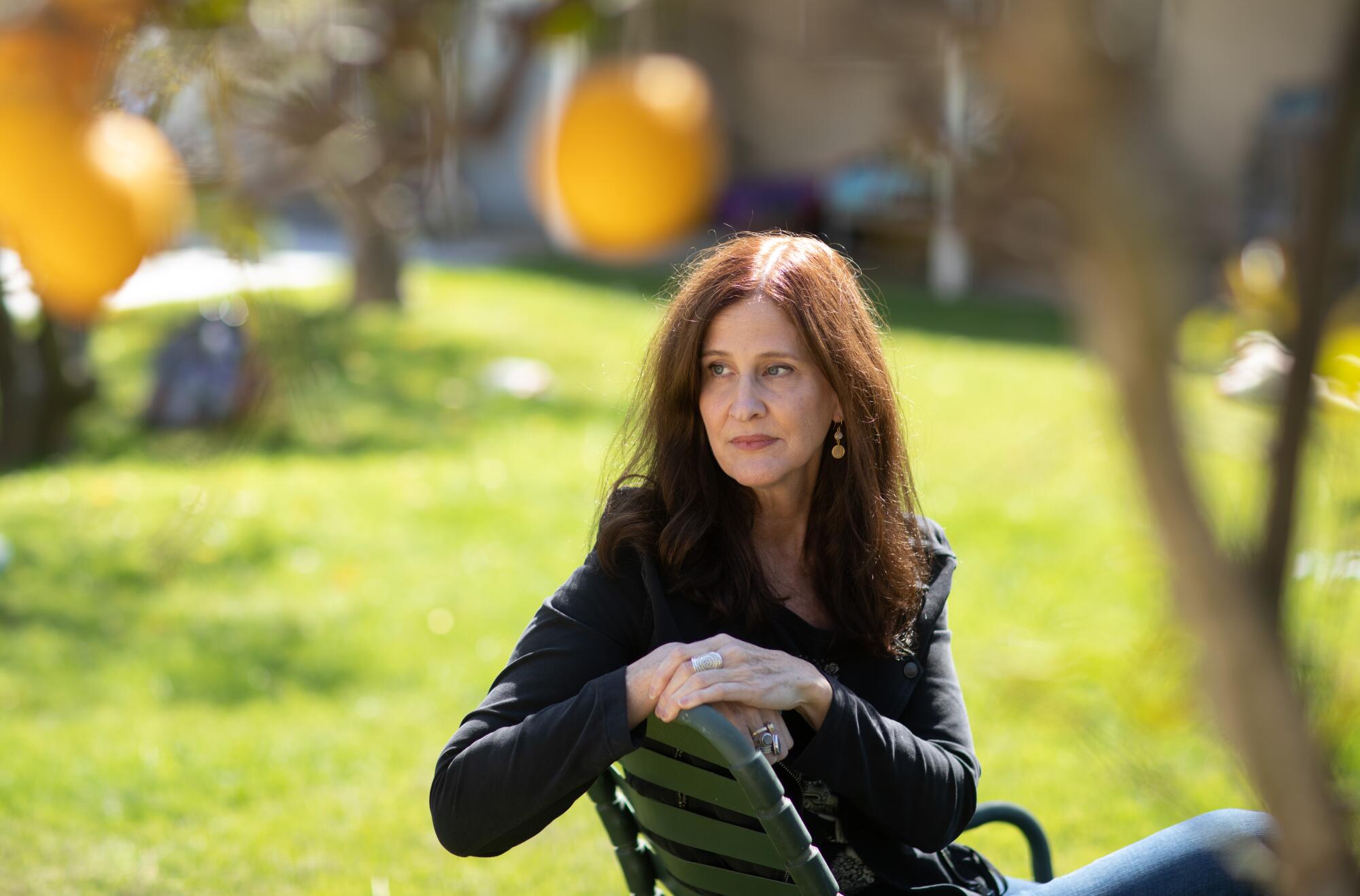
Span protection
Los Angeles-based Terri Kopp began writing for television more than 25 years ago, on network shows like NBC’s “Law & Order” and later “Proven Innocent” on Fox.
But the rapid shift to short-order series has meant a significant erosion of her pay. While the number of episodes has decreased, the span of time to produce them is often drawn out over many weeks — without compensation, she said.
“I’m making half the money I made,” said Kopp, whose writing and producing credits also include “The Chi” on Showtime and “BMF” on Starz.
The WGA implemented so-called span protections in 2017, ensuring that if a writer works more than 2.4 weeks per episode, then they must be paid more. But not all shows are covered under these protections.
“With streaming and a lot of cable outlets now, they’re just stretching out 10 episodes over an entire year,” said Kopp, who is an executive producer and writer on Starz’s “PowerBook IV: Force.” “My episodic fee suddenly gets diluted, and I have found myself getting paid scale.”
Kopp, who began her career as a public defender in New York City, said she became acutely aware of this new reality when she created the show “In Contempt,” about a Manhattan legal aid society lawyer, in 2016 for BET.
“I’ve achieved the sort of thing that all of us TV writers are hoping for, that you get to create your own show. And that feels like where you’re finally going to make a lot of money,” Kopp said.
However, after she opened a writers room where they wrote 10 episodes, the 24-week schedule was extended to 30 weeks and the network paused production.
According to Kopp, the length of the writers room just covered her episodic fee at scale.
“I actually was making less money as a creator of the show than I was 15 years prior on ‘Law & Order’ as a producer,” she said.
A year later, when BET put the show back into production, Kopp didn’t fare much better financially. While she was paid a royalty fee of $5,000 per epsiode as its creator, and a fee for writing the pilot, she earned the base scale rate.
And Kopp said she wasn’t paid for the additional six weeks of postproduction, about $40,000 at scale, because that pay was not considered part of writing services.
“It’s demoralizing,” she said. “You can’t really say no. I mean, you can drive as hard a bargain as you can in the negotiation, but at the end of the day, you want your show to get made.”
As AI is becoming more ubiquitous, the Writers Guild is proposing some guidelines for how to regulate it and avoid writers being cut out of the creation of TV and film.
Hurdles for emerging writers
For writers coming up during the age of streaming, the boom in production has not necessarily been matched by financial or career opportunities.
Anthony Florez, 37, a Native American and member of the Pyramid Lake Paiute Tribe, grew up splitting his time between Reno and the reservation about 35 miles away. His path to television began in 2016, while he was serving in the Navy. By chance, he became a military technical advisor on shows like TNT’s “The Last Ship.”
Unscripted programming is once again poised to serve as a stopgap for networks and streaming services, but since the last strike, it has matured into a formidable genre.
“I didn’t grow up near television, nowhere near art, nowhere near any sort of a life that I thought I’d be a TV writer, that’s for sure,” Florez said. “All the men in my family are in the military.”
Working as a military technical advisor — giving notes, helping to craft pitches and characters, making dialogue more authentic — gave him a taste for scriptwriting.
In 2018 Florez was accepted into a Writers Guild Foundation veterans writing project and the Fox Writers Lab, a fellowship program supporting diverse voices. That year at NYU he was awarded the Tisch School of Arts Dean’s Fellowship in dramatic writing, which led to a staff writing job on the Fox noir/western crime drama “Deputy” in 2019. A year later he wrote and directed the short feature “Two Bears.”
Florez, who is a co-chair of the WGA Native American and Indigenous Writers Committee, said that it’s been the industry’s renewed focus on inclusion more than the upsurge of content that has propelled his career. Last year, he was one of an all-Native American writing staff on the AMC series “Dark Winds,” about two Navajo police officers in the 1970s.
“I do think that the push for diversity and hearing from different voices in Hollywood helped make [“Deputy”] happen,” he said. “And so, I was a beneficiary of sort of those social movements.”
But Florez notes there is a significant chasm between opportunities to write and the ability to earn a living from it.
“It does feel awkward to be in an above-the-line job and feel like I’m barely living a decent life, you know, and I can’t buy a house,” he said.
Florez said he was executive story editor on six episodes on “Dark Winds” and earned a writing credit and script fee for an episode he wrote. Nonetheless, he said the production would not pay for him to work on set producing his episodes, costing him $20,000 and the opportunity to gain crucial experience.
“I’m a co-producer now, and I’ve never been on set of a single show that I worked on or have been able to give notes on a table read or ask actors to work through things and get better at my job,” said Florez, who aims to eventually become a showrunner. “And so, I don’t have the opportunity to actually go be better at my job.
“The irony is that I was on more sets when I was a military technical advisor,” he added.
Florez said that he’s had to accept writing projects with no financial security and uncertainty just to get his foot in the door.
Between 2020 and 2022, Florez said he worked on an “if-come” deal with 20th Century Studios to develop an hourlong drama series. In this scenario, writers are given a contract for a payout only if their television concept is picked up for distribution by a network. In Florez’s case, when networks declined to buy the show, the studio dropped the project and Florez says he didn’t earn a dollar for his time.
“It’s very frustrating because you’re at the whim of their notes and you’re at the whim of their timeline,” he said. “They don’t have to pay us and can shop our project without putting any money down.”
More to Read
Inside the business of entertainment
The Wide Shot brings you news, analysis and insights on everything from streaming wars to production — and what it all means for the future.
You may occasionally receive promotional content from the Los Angeles Times.


